
|

Kids are expected each February.
Disclaimer: Below is a hodge podge of information that I put together for myself. It is basic information that I have found on the internet, through my vets, or personal experience.
Foot Rot (Hoof Rot)
Symptoms: Lameness, a distinctive bad odor and rough, ragged, broken sides and sole of hoof. Wet, dirty soil encourages the problem and once the ground becomes contaminated, infections spreads. Prevention includes keeping hooves trimmed and the barnyard well drained and clean. If barnyard is contaminated, remove the goats for a month or more, broadcast lime generously and wait until the bacteria dies off. Treatment for foot rot consists of trimming away the rotted parts of the hoof. This may need to be done gradually until all the diseased portions have been eliminated. During treatment use Hoof 'n Heel or Kopertox topically to help heal and strengthen the hoof. Antibiotic injections may be necessary. give 4 1/2 cc of tetracycline or 5 cc of penicillin every 3 days for a total of three injections.
Supplies for prevention and treatment: Hoof Trimmers, Hoof Plane, Hoof Pick, Hoof 'n Heel, Kopertox, Biomycin/Tetracycline.
Mastitis is a serious health problem. If not diagnosed early and treated aggressively it can result in costly medical bills, permanent damage to the udder, decreasd milk production and in sever cases, even death. Inflammation occurs when bacteria, viruses and the like invade the udder and/or mammary glands.
The best prevention is cleanliness. Keep the barn and barnyard clean at all times. Practice clean milking habits. Keep the udder well trimmed, wash teats and udder thoroughly with Udder Wash and always milk with clean, dry hands. Use a strip cup for the first few steam of milk and examine closely for flakes or strings. Always milk gently and do not over milk. Wipe the teats clean after milking and apply Fight Bac to teats. It's inexpensive, highly effective and easy to use. Test the milk once a week with mastitis cards. Early diagnosis is your best chance for successful treatment.
Symptoms of mastitis include a decrease in milk production, flakes or
strings on the strip cup screen and a hot, swollen, red udder. Blook
in the milk may also be a symptom. The CMT kit can also be used if
a problem
shows up on the strip cup screen.
Mastitis treatment may include antibiotic injections as well as antibiotic
teat infusions. Apply hot packs twice a day for 10 minutes and gentle
massaging with peppermint oil to increase circulation. More frequent
milking may also be helpful.
Goat Serum Concentrate is very effective in treating mastitis. give a 10 cc Sub Q two days in a row and during those two days do a 15 CC teat infusion of the Concentrate after each milking.
Supplies for prevention and treatment: Udder Wash, Fight Bac, Mastitis Test Cards and/or CMT Kit, Strip Cup, Injectable Antibiotic, Teat infusions, Goat Serum Concentrate, Mastoblast, Mastocream and teat infusion cannulas.
Several conditions warrant the use of medications infused directly into the teat. This procedure, called intramammary infusion involves implanting an antibiotic medication such as "Tomorrow" when drying off a lactating does and "Today" for treating mastitis. Goat Serum Concentrate can also be infused for treating mastitis as an alternative to antibiotics. We emphasize the importance of cleanliness in this procedure to avoid the introduction of dirt and bacteria into the teat. Neosporing antibacterial ointment is excellent for lubricating the cannula for easy insertion. Partial insertion, just beyond the sphincter muscle is correct. Full insertion can disrupt the kerating plug encouraging further bacterial infection.
When excessive amounts of gas collect in the rumen as a result of overeating new grass or pasture that is wet, bloating may occur. It is visible as swelling on the left side back by the hip bone at the end of the rib cage. A goat with bloat will show signs of severe distress, grunting, slobbering, much restless activity, and labored breathing.
Scours need immediate attention because of dehydration, weakness and sudden death. We give a 10 cc sub Q injection of Goat Blood Serum to the newborns as soon as they are born to avoid scours in kids. Bottles and nipples must be washed thoroughly after each use. Probios gel is excellent for balancing the good bacteria in the system and often can be used to correct a problem if caught right away. A severe worm infestation can also cause scours and worm medication must be given as well as something to stop the diarrhea. Medications used for humans, such as Keopectate works great.
Supplies for prevention and treatment: Blood Serum Concentrate, Probios Gel, Kaopectate
Diarrhea, weight loss and arrested growth in kids age 3 weeks and older may be the first signs of coccidiosis. Testing a stool sample may reveal coccidiosis to be the cause but remember, something as simple as change of diet, indigestion, or too much milk or solid food at a feeding can also result in diarrhea. More serious causes for such symptoms may be a worm overload, E.Coli or even enterotoxemia. It's vital to know what your dealing with before you start treating so you don't give inappropriate medications.
Coccidia, the protozoal parasite that causes coccidiosis, is bree specific. Of the numerous coccidia protozoa specific to goats, only 4 types cause goats to get really sick. The good news is that a mild (subclinical) case of coccidiosis will give protective immunity. A full blown (clinical) infection attacks the intestinal lining causing inflammation and much discomfort. If profuce bleeding ensues, death can occur from blood loss. Other causes of death from coccidiosis are dehydration, electrolyte imbalance and acidosis. Sadly, serious (clinical) infections can leave intestinal scarring and stunted growth due to poor digestions and nutritional mal-absorption.
Preventative measures:
Control and treatment for coccidiosis:
Amprolium (Co-Rid) is not recommended for goats. The huge doses necessary for the effective treatment of coccisiosis in goats (10 times the cattle dose) creates a vitamin B1 (thiamine) deficiency that results in the goat contracting polio.
Occurs within the last few weeks of pregnancy. Common symptoms include loss of appetite, spastic motion, twitching ears and inability to stand. Labored breathing, coma and death can result. Starting 2 weeks prior to kidding add a heaping teaspoon of Gener-VNC to the daily grain ration. This will provide a gram of naicin to avoid Ketosis. Also, provide a sufficient, balanced diet with no sudden or drastic changes, high quality hay and at least a half pound of grain daily and at regular hours. Exercise is also essential to build strong bodies and good appetites. At the onset of any symptoms the Gener-VNC and several pumps orally of Nutri Drench daily can reverse the condition.
Supplies for prevention and treatment: Gener-VNC and Nutri Drench.
A common goat problem especially with nursing kids. The good news is that once a goat has contracted it (usually for a couple of weeks), they never get it again. The sores and eventual scabs usually form around the mouth, eye lids and teats. The mouth sores inhibit eating so you must give special attention to individually feeding the ones that won't eat on their own. Treat the sores by cleansing and applying an antibiotic ointment. Scratch type vaccine????
Topical treatment involves keeping the disease controlled by lancing and cleaning out the abscesses when they are "ripe" and covering the site with antibacterial ointment. Actually only a small percentage of lumps are CL. Several laboratories make custom CL vaccine that is safe and effective for goats.
This is primarily a problem for the male and occurs most often in castrated bucks. Calculi builds up to obstruct the flow of urine and the results are fatal. Symptoms to watch for are stretching and straining while trying unsuccessfully to urinate and other stress related signs such as total loss of appetite, withdrawl, distress and subsequent death. Dietary guidelines include very limited grain ration, added salt to encourage water intake, as well as supplements such as ammonium chloride to acidify the urine and free choice minerals. In the case of wethered males, urinary tract growth is arrested at the time of castration leaving the adult goat an inadequate means for eliminating the waste and an invitation for calculi to form. Delay castration as long as possible to allow proper growth of the urinary tract, provide free choice minerals at the proper calcium to the photphorous ratio, add ammonium chloride to the minerals or ration and supply plenty of clean fresh water.
Feeding a feed that is low in calcium will decrease the chances of developing urinary calculi. Additionally, Ammonium Chloride is used for the prevention and treatment of urinary calculi in male goats. Some feeds contain ammonium chloride so check the label.
Ammonium Chloride doses:
Prevention dose: Top dressing 1 tsp. per 150 pounds (goat weight) on your goat's
food per day.
Treatment dose: 1 Tbs. per day.
Caution: Ammonia toxicity can be a potential problem, however the oral dosing
of ammonium chloride to treat urinary calculi is a desperation effort. Therefore,
the risk of ammonia complications may be tolerable in light of impending death
if urine flow is not reestablished.
One pound bag contains about 105 tsp. (41 Tbs.)
We are pleased to now offer Ammonium Chloride. Please visit the RD Ranch Barn Sale & Gift Shop.
Goats are stressed when they are moved. Stress causes immune system suppression and with the immune system compromised any number of awful problems quickly develop. Some common symptoms that are contagious to the rest of your goats include: pink eye, pneumonia, scours and mastitis. A suppressed immune system is an invitation to more serious conditions such as CAE and CL. Administering 10 cc Sub-Q injection of Goat Serum or Bovi Sera before and after any move virtually takes the worry out of buying, selling and showing goats. These serums give a tremendous boost to the immune system, thus eliminating the danger of shipping fever.
A blood calcium deficiency in does just before, during and just after kidding.
Causes: Excessive calcium intake that exceeds her needs and the needs of her unborn kids. When the demand for calcium suddenly increases for milk production a hormone that hinders the release of calcium from her bones results in the depletion of blood calcium resulting in milk fever.
Symptoms: Wobbly, gait in hind quarters, (dragging of the hind foot), constipation, and inability to withstand normal labor.
Prevention: Lower the intake of calcium during the last 30 days of pregnancy until just before kidding. This is accomplished by eliminating alfalfa from the diet. If this is not possible, be sure the grain mix has no calcium additives. If feeding only grass hay, the grain mix should have a small percentage of added calcium.
Deficiency symptoms include skin disorders, white muscle disease (a type of muscular dystrophy), lowered reproduction and conception rate, decreased milk production and milk quality.
If necessary, administer injectable Bo-Se before breeding and 4 to 6 weeks prior to birthing. Kids can be treated at birth and at one month of age. Treat bucks twice a year. The adult goat dosage is 1 to 2 times that of sheep and for normal size kids the minimum sheep dose is recommended.
Causes: Deadly organisms found in the environment and the digestive tract associated with changes in feed, quantities of feed, accessibility new lush areas for grazing, over eating by very hungry goats.
Symptoms: Depression and incoordination, diarrhea, listlessness, sudden death.
Treatment: For a presumptive diagnosis administer a large dose (40cc or more) of clostridium perfringens c and d antitoxin at the onset of symptoms. If the goat recovers, even briefly, you can assume that enterotoxemia is the correct diagnosis and repeated doses of antitoxin every 4 to 8 hours may be necessary to save the goat's life. A charcoal product such as universal antidote gel administered in large doses may also be helpful.
Prevention: Follow a regular vaccination program. In addition, sensible feeding practices are also essential. Avoid excess feeding of both kids and adults. Make gradual changes in feed if necessary and gradual introduction to new lush areas. Do not allow kids or adults to get overly hungry. Feed baby goats often and adults at reasonable intervals to prevent excessive hunger and over eating.
Causes: Inflammation of the tissue on the underside of the hoof wall and sole of the front feet. Commonly seen at kidding, or as a result of feed changes that bring on enterotoxemia, or after a bout with an infection such as mastitis or pneumonia.
Symptoms: High temp (up to 107 degrees), laborious movement, especially getting up and down. Feet feel hot to the touch and the goat will resort to "knee walking" due to the acute discomfort of walking on their feet.
Treatment/Prevention: Caution must be taken to avoid excessive grain feeding at kidding time and immediately after as this can trigger enterotoxemia followed by "knee walking". Neglected hoof trimming where "snowshoe feet" are evidenced will also result in laminitis. A round of antihistamines along with electrolyte drenching as been seen to aid in treatment. After prolonged labor at kidding time a series of biomycin injections (4cc every third day for 3 injections) can help prevent the problem. Good herd management really goes a long way in prevention: attention to feeding, hoof trimming and general attention to cleanliness.
Prevent newborn "naval ill" but cutting umbilical cord about 6 inches from the body, dipping completely in tincture of ioding and clamping off with naval cord clamps.
Administer a 10 cc Sub Q injection of Goat Serum Concentrate or 5 cc of Bovi Sera to provide the essential anti bodies the babies must have to build a strong immune system.
Feed each kid a minimum of 10% of its body weight per day in milk.
When the kids are 3 days old give them a little bit of wormer (less then half and adult dose). This eliminates any chance of worm problems with the nursing kids.
Allow the kids to sample a little hay and grainand wean them when they are eating enough to start chewing their cud (around 3 months old).
For coccidiosis prevent, starting at 3 weeks old, feed 1/2 cc of DiMethos 40% injectable (often called "Albon" orally twice a day for one week, then once a week until weaned.
Free choice loose minerals: minerals that are formulated just for goats are perfect for providing all necessary trace minerals, salt and vitamins for strong bones and teeth and promote general good health. A ratio of two parts calcium to one part phosphorous is best. Kelp is high in iodine as well as other minerals and fiber. It can be offered free choice or a small amount may be added to the grain every day. Rumin Buffered Bicarbonate of Soda is of great benefit in maintaining pH balance in the rumen for good digestion. It can be offered free choice. Mineral mix for sheep should not be given to goats because it does not contain enough copper.
Goat Serum Concentrate - Protect your kids from the leading causes of newborn disease and death. Also effective as a treatment for infections in adult goats such as mastitis and shipping fever complex.
Bovi Sera - For use as an aid in the prevention and treatment of conditions such as pneumonia and enterotoxemia, passive immune failure in newborns and shipping fever complex. Especially helpful for weak newborns. Labeled for calves, cattle and sheep. Cheaper to use then the Goat Serum Concentrate. Dosage of 10 cc sub-Q injection for adults and a 5 cc sub-Q injection for newborns.
Di-Methox 40% - Use as a preventative for coccidiosis. Start treatment at three weeks of age, administer orally twice daily 1/2 cc for one week (14 doses total) and 1/2 cc dose once a week until weaned.
Di-Methox 12.5% - Five days of oral dosing with a mixture of 1-1/2 tbsp of Di-Methox and 1-1/2 tbsp of water.
For Kidding time:
For Disbudding, Castrating and Tattooing:
First Aid Emergencies:
General Care:
Nubian Goats
Nigerian Dwarf Goats
Goats for sale
Goat Information Links
Goat Medical Information
Goat Photo Album (photos provided by new
owners)
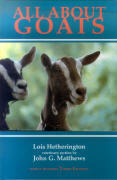 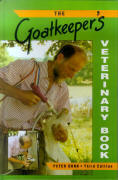 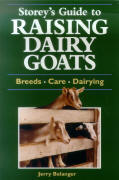 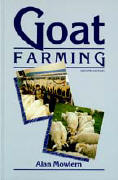 Suggested goat books available from the RD Ranch Barn Store & Gift Shop |
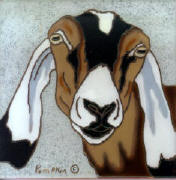 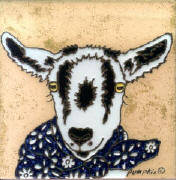 Pygmy & Nubian Painted Tiles available on our online store |
| Please visit the RD Ranch Barn Sale and Gift Shop online store. We carry a beautiful line of handcrafted animal tiles including the Rat Terrier as well as a full line of Cetacea pet supplies, books, dvd's, Schylling retro toys, Milky Way soap molds, Brecks fishing lures (Williams, Mooselook, Savant, and Lake Clear Wabblers) and many other items. The items we carry are quality items that we use in our home, barn, or while hunting or fishing. | |
|
About
Us | Anatolians | Dexter
Cattle | My
Milk Cow | Nubians |
Nigerian
Dwarfs Rat Terriers | Family/Friends | Home Page | RD Ranch Blog | Enter the Store | Site Directory |
|
|
IMPORTANT: All right title and interest in individual photographs posted on this site will remain the exclusive property of the RD Ranch. Any redistribution, retransmission, or publication of any material or content on this site is prohibited without the express written consent of the copyright owner. All photos are the copyrighted material of the photographer and may not be used without permission. |
| Send email to info@rdranch.net with questions or comments about this web site. | |